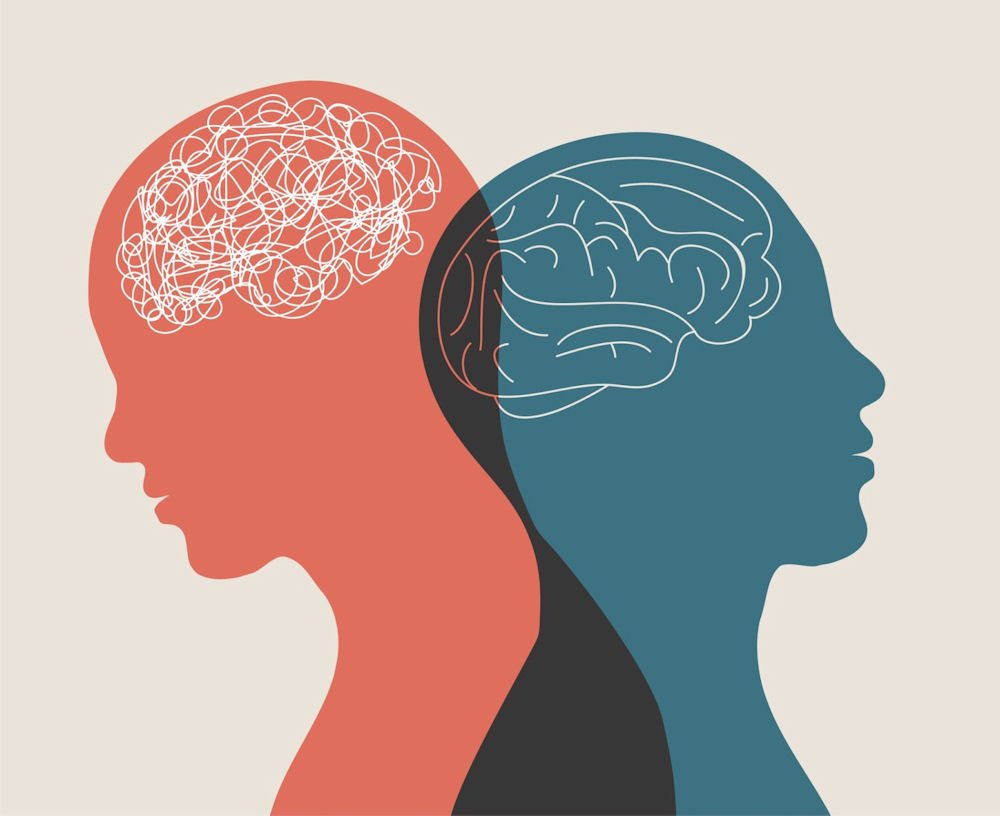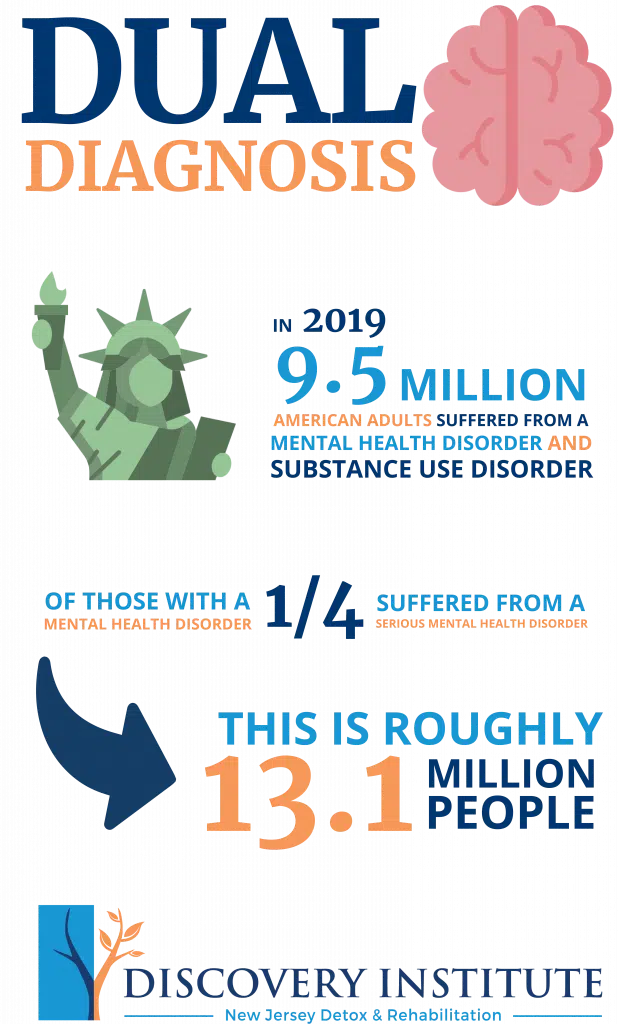Dual Diagnosis Treatment Center in NJ
What are Co-Occurring Disorders?
 During treatment for substance dependence, you will frequently hear the term “co-occurring.” This refers to the presence of multiple disorders, including addiction and mental illness. Some of the mental health disorders which often co-occur with substance use disorders including:
During treatment for substance dependence, you will frequently hear the term “co-occurring.” This refers to the presence of multiple disorders, including addiction and mental illness. Some of the mental health disorders which often co-occur with substance use disorders including:
- Anxiety Disorders
- Depression
- Schizophrenia
- Bipolar disorder
- Obsessive-compulsive disorder (OCD)
- Post-traumatic stress disorder (PTSD)
- Attention-deficit hyperactivity disorder (ADHD)
- An eating disorder (i.e. anorexia nervosa, bulimia nervosa, binge eating disorder, etc.)
Those who suffer from co-occurring disorders have what is known as a dual diagnosis. Specific and individualized treatment is critical to a successful recovery from drug addiction. So, if you or someone you know is suffering from the effects of a mood or mental health disorder along with alcohol addiction or drug abuse, it’s best to learn as much as possible about treatment options for dual diagnosis cases.
Here at Discovery Institute our dual diagnosis treatment centers in New Jersey work to provide you with information about how to best identify and treat mental illness and substance abuse.
Statistics: The Prevalence of Co-Occurring Disorders
The 2014 National Survey on Drug Use and Health reported that about 20.2 million people were struggling with a substance use disorder. The same report stated that around 7.9 million people were suffering from a mental health disorder in addition to substance abuse in the United States. Although most of those who reported having a dual diagnosis were men, many women also suffer from mental health conditions and substance use disorders.
People who have a dual diagnosis (also known as comorbidity or co-occurring disorders) have a substance use disorder (SUD) and mental health issues simultaneously. Some individuals may be struggling with both of these disorders.
One of the main questions that come up regarding dual diagnosis cases is whether the mental health disorder or the substance use problem occurred first. The truth of the matter is that the order of occurrence varies from person to person. In other words, sometimes substance dependence comes first and leads to the development of a mood disorder or mental illness. In other cases, it’s the other way around.
Sometimes, individuals who are dependent on alcohol or drugs may develop disorders such as anxiety or depression. There are also situations in which people who have disorders like OCD or PTSD turn to alcohol or drugs for relief from the symptoms they’re experiencing.
Many people also develop addictions as a result of the medications they use to treat the symptoms of their mental health or mood disorders. Professional substance abuse treatment and mental health treatment programs are essential and required to be able to manage one’s condition, and live healthily.
CONTACT US
Find out how we can help
Our compassionate counselors are standing by to answer any questions you may have. After helping thousands of people over the last 50 years, we have the resources to help you and your family and all your individual needs.
An Overview of Some Common Co-Occurring Disorders
Some of the disorders which commonly co-occur with addiction include various anxiety disorders, depression, bipolar disorder, eating disorders, post-traumatic stress disorder, etc.
Anxiety: There are varying types of anxiety disorders, including generalized anxiety disorder (GAD) and panic disorder. Anxiety is generally characterized by consistent and excessive worry or fear.
Post-Traumatic Stress Disorder: Also known as PTSD, this disorder often affects people who have gone through a traumatic experience. This includes individuals who have been physically abused, witnessed a crime, been involved in combat, or experienced a serious incident such as a car crash.
Bipolar Disorder: People who have bipolar disorder often experience a combination of mania and depression. The episodes of mania may involve symptoms such as hyperactivity and racing thoughts. Episodes of depression may be characterized by extreme sadness and feelings of worthlessness, helplessness, or hopelessness. Bipolar disorder must be treated by a professional.
Depression: This disorder is often characterized by feelings of sadness and uselessness. Individuals may also lose interest in activities they once enjoyed and become more pessimistic.
Dual Diagnosis Treatment: Managing Substance Abuse and Mental Health Disorders
 Many times, people who have mental health disorders in addition to substance abuse problems feel unsure about how to get the best help for their journey to recovery. It can be difficult to determine which treatment centers can offer the right kind of assistance, especially when both mental health and physical health are involved.
Many times, people who have mental health disorders in addition to substance abuse problems feel unsure about how to get the best help for their journey to recovery. It can be difficult to determine which treatment centers can offer the right kind of assistance, especially when both mental health and physical health are involved.
There are also many instances in which treatment centers overlook or do not recognize the signs of mental illness in the lives of their clients. As a result, they often treat the addiction problems that exist in their patients without properly addressing co-occurring disorders.
This can be very problematic. If individuals receive treatment for substance use without getting help in addressing their mental health needs, they are put at risk for relapse since they were not equipped with the skills they need to avoid becoming overwhelmed by the symptoms of their mental health disorders.
Our Approach to Substance Abuse and Addiction Treatment
Here at Discovery Institute, we are committed to making sure that our clients receive the necessary medical services and help that they need to successfully overcome substance abuse and mental health issues in their lives. Those with a severe substance use disorder typically will undergo medication-assisted treatment (MAT), and enter residential treatment. People who can live at home while still receiving addiction treatment will receive outpatient services at our outpatient dual diagnosis rehab center.
Our specialists are trained to recognize the symptoms of these disorders. We understand that, for many people in our co-occurring dual diagnosis program, the symptoms of underlying mental health conditions and other contributing factors to addiction. So, we work to identify and address them through utilizing evidence-based integrated treatment.
At our dual diagnosis treatment facility, we diagnose and treat anxiety disorders, mood disorders, etc. Symptoms of an anxiety disorder and depression can range from minor to severe enough to impact a person’s day-to-day life. When severe symptoms are unmanaged, many people begin to self-medicate with drugs and alcohol, which leads to addiction. When mental disorders symptoms are managed through medication and therapy, the likelihood of turning to drugs and alcohol greatly decreases.
Substance dependence and mood disorders often go hand-in-hand, but still need two different treatment approaches, which is why it is called co-occurring. Discovery Institute’s dual diagnosis treatment center works with each client to come up with a unique co-occurring program based on their specific needs.
While we work to wean our clients off of the drugs or alcohol they were dependent upon, we also treat their secondary mood disorder with appropriate, non-habit-forming medication management and behavioral therapy such as cognitive-behavioral therapy (CBT), dialectical behavior therapy (DBT), individual therapy, group therapy, family therapy, etc.
We work to provide alternatives to drugs and alcohol to prevent relapse in the future. A client’s co-occurring issues are re-assessed throughout treatment to determine if medication and therapy need to be altered. Our goal is to have our client’s dual diagnosis correctly managed by the time they leave treatment and to provide healthy alternatives and tools to combat addiction.
Receive Mental Health Care and Substance Abuse Treatment at Discovery Institute

If you or someone you know is suffering from substance abuse as well as a mental health disorder, there is hope! Here at Discovery Institute’s dual diagnosis treatment center, we are dedicated to bringing people into the light of freedom from addiction and mental health challenges. We are also committed to helping individuals develop healthy coping methods and learn how to best approach their conditions.
You don’t have to fight substance use disorder by yourself; our understanding and compassionate team is here to help you on your journey to recovery. Through a professional detox process, we manage withdrawal symptoms and prepare people for treatment. Also, through our effective and individualized therapy approaches, individuals can gain the skills they need to remain free.
For more information about our dual diagnosis treatment services here at Discovery, please contact us today. Allow us to walk with you as you pursue the addiction-free life you truly deserve!


